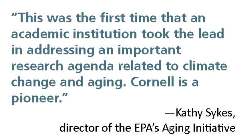 Older adults are likely at greater risk from climate change. Recognizing the urgency of this unstudied problem, researchers in the College of Human Ecology brought together experts in the both the social and natural sciences to begin to make recommendations.
Older adults are likely at greater risk from climate change. Recognizing the urgency of this unstudied problem, researchers in the College of Human Ecology brought together experts in the both the social and natural sciences to begin to make recommendations.
When Hurricane Katrina engulfed New Orleans in 2005, catastrophic flood waters and fierce winds crippled the city’s infrastructure, caused billions in property damage, and killed an estimated 1,500 Louisiana residents. The death toll cut across all races, but one characteristic stood out among the storm’s victims: nearly three-quarters of the dead were aged 60 and older, with 50 percent of the victims aged 75 and older.
The stark difference in survival rates between young and old illustrates what scientists believe to be a greater vulnerability among seniors to environmental calamities like Katrina, where the elderly—many physically frail and with limited mobility—could not evacuate coastal areas ahead of the hurricane’s onslaught. Older adults also figure to have the most trouble coping with the predicted negative consequences of climate change, such as the accelerated spread of human diseases, declines in air and water quality, energy shortages, rising temperatures, food supply volatility, and loss of suitable habitats. Read the full story

